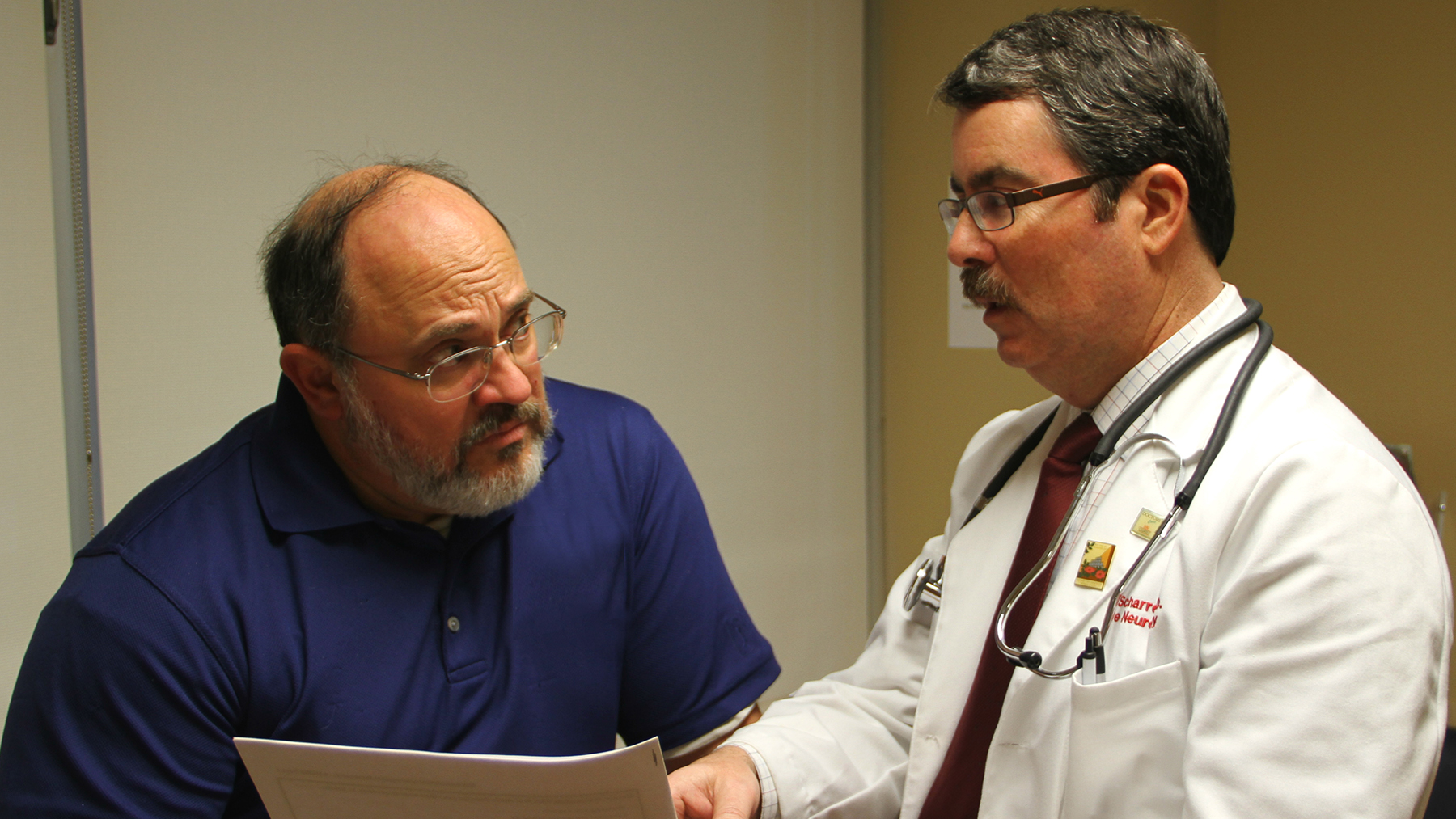When should we tell people about dad’s Alzheimer’s?
Our expert gives guidance on the questions that come with a dementia diagnosis

Dr. Douglas Scharre of The Ohio State University Wexner Medical Center talks with a patient about the pen-and-paper test that he and his research team developed to detect early signs of Alzheimer's disease and other types of dementia.
Talk about an overwhelming moment in life: Your mom or dad has been diagnosed with Alzheimer’s and you have to help with the decision about when and how to share the information outside your close family circle.
What do you do? How do you even begin to help your parent decide whether to tell the grandchildren, your far-flung family members on Facebook or his or her buddies from card club, church or the senior center.
In actor Gene Wilder’s case, he decided to keep his Alzheimer’s diagnosis private from his many fans. His family says he didn’t want the news of his disease to bring sadness instead of the happiness that so many associated with his characters – especially for children who recognized him as Willy Wonka.
Doctors at The Ohio State University Wexner Medical Center counsel people every day who are facing the many questions that come with their loved one’s diagnosis of Alzheimer’s disease or other form of dementia. How can I help my loved one maintain the highest quality of life? What about his finances? How will I know what treatments she wants when she isn’t thinking clearly?
Our expert Dr. Douglas Scharre, who created a test to detect early signs of Alzheimer’s and other dementia, shares some of the information that he discusses with families in this situation.
But before we get to his insights, take action today to help your loved ones try to avoid the worst effects of dementia. Encourage them to take Ohio State’s pen-and-paper test known as SAGE – Self-Administered Gerocognitive Exam – to look for clues that dementia might be setting in.
Detecting the illness early can make a world of difference, says Dr. Scharre, director of the Ohio State Division of Cognitive Neurology.
“Earlier treatment leads to improved functionality and better quality of life for patients and caregivers,” he says. “Plus, earlier treatment reduces costs.”
Here are some of the concerns that he hears from families and how he responds:
How do I start the conversation with my mom or dad who has been diagnosed with Alzheimer’s or another form of dementia?
It is important to start the conversation right away around memory impairments. Acknowledge the diagnosis and have an open discussion about how you and your mom or dad feel about the news.
"Mom, it makes me sad and a little bit scared that you have Alzheimer’s. I want you to know that I will be with you every step of the way to support you and be there for you no matter what happens. We are in this together."
Making sure a healthcare power of attorney, living will and advance directives are in place for your loved one will be very important as the disease progresses and the person becomes unable to communicate his or her wishes.
"Mom, I am concerned for you and want to make sure I can help keep you safe as your memory changes – whether that’s tomorrow or years from now. There are some things we need to put in place legally to make sure that I can help make decisions for you if you cannot make them for yourself."
When should we tell people outside our immediate family about the diagnosis?
This varies for each patient and family based on how comfortable they are sharing the news with others. The person who has been diagnosed should make the decisions early on about whom to tell. Be sensitive to how the diagnosis has affected your family member. Many patients are embarrassed about having a neurologic problem and believe others will think of them as “crazy” or “stupid," think less of them or treat them differently.
As the disease progresses and memory worsens, it likely will become necessary for caregivers to share the diagnosis. Telling others about the disease and its impact ensures that those around them can offer the most help.
What should I do if I can tell that my dad is having a hard time communicating?
Caregivers should try to anticipate thoughts or actions and help with words or suggestions to the patient. Patients will feel more secure if they have the presence of a loved one to help them answer if they get stuck with words. If they have very mild symptoms, they can ask their friends and family to help out with words or explanations.
Dr. Scharre says that detecting a memory problem early will help with all of these things:
- Identifying a course of treatment
- Increasing the chance of gaining access to clinical trial medications
- Providing increased oversight and supervision to reduce common errors seen with finances, driving, medication use and symptom reporting
Here’s an explanation about how the questions on the SAGE test work.
If you think a family member or friend may have memory problems, share Ohio State's quick memory quiz with the person.




